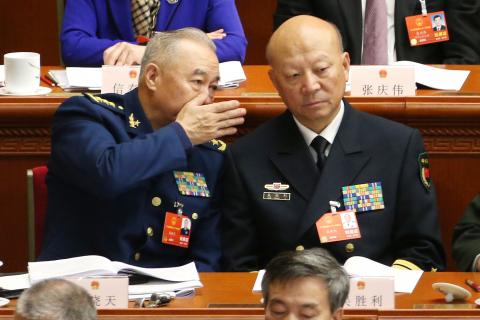The Ministry of National Defense yesterday reiterated President Tsai Ing-wen’s (蔡英文) pledge to increase the nation’s defense spending every year after this fiscal year.
The statement came after China announced it would raise its military spending this year.
China’s official military budget is to be 1.11 trillion yuan (US$175.1 billion), a 8.1 percent increase from last year, when China raised the budget 7 percent, Xinhua news agency reported.

Photo: EPA
Tsai has pledged to raise to the defense budget every year and earmark expenditures for planned procurements, ministry spokesman Major General Chen Chung-chi (陳中吉) said.
The government is also to make special budget proposals to cover the costs of major unplanned arms deals, instead of deducting such expenses from the defense budget, Chen said.
“This ministry is committed to promoting national defense autonomy and the security of our nation,” he said.
Meanwhile, China’s Taiwan Affairs Office Minister Zhang Zhijun (張志軍) blamed Taiwan for “increasingly severe and complicated” cross-strait relations at a news event yesterday marking the opening of China’s 13th National People’s Congress.
“We have resolute will, full confidence and even fuller ability to prevent any sort or form of Taiwan independence separatist acts,” Zhang said.
China has “encountered more risks and challenges” in cross-strait relations due to Taiwan’s refusal to acknowledge the so-called “1992 consensus” and “more forceful interventions by outside forces,” Zhang added.
The “1992 consensus,” a term former Mainland Affairs Council chairman Su Chi (蘇起) in 2006 admitted to making up in 2000, refers to a supposed tacit understanding between the Chinese Nationalist Party (KMT) and the Chinese Communist Party that both sides of the Taiwan Strait acknowledge there is “one China,” with each side having its own interpretation of what “China” means.
Taiwan is not the side that has been acting in ways that are detrimental to the relationship, Presidential Office spokesman Alex Huang (黃重諺) said.
The government’s commitment to peace and goodwill has been clear and consistent, a fact that is not missed by the international community, he said.
“The goodwill and promises of this government are unchanged. We have no intention of returning the nation to a confrontational course of action or bowing to pressure,” he said.

SECURITY: As China is ‘reshaping’ Hong Kong’s population, Taiwan must raise the eligibility threshold for applications from Hong Kongers, Chiu Chui-cheng said When Hong Kong and Macau citizens apply for residency in Taiwan, it would be under a new category that includes a “national security observation period,” Mainland Affairs Council (MAC) Minister Chiu Chui-cheng (邱垂正) said yesterday. President William Lai (賴清德) on March 13 announced 17 strategies to counter China’s aggression toward Taiwan, including incorporating national security considerations into the review process for residency applications from Hong Kong and Macau citizens. The situation in Hong Kong is constantly changing, Chiu said to media yesterday on the sidelines of the Taipei Technology Run hosted by the Taipei Neihu Technology Park Development Association. With

‘FORM OF PROTEST’: The German Institute Taipei said it was ‘shocked’ to see Nazi symbolism used in connection with political aims as it condemned the incident Sung Chien-liang (宋建樑), who led efforts to recall Democratic Progressive Party (DPP) Legislator Lee Kun-cheng (李坤城), was released on bail of NT$80,000 yesterday amid an outcry over a Nazi armband he wore to questioning the night before. Sung arrived at the New Taipei City District Prosecutors’ Office for questioning in a recall petition forgery case on Tuesday night wearing a red armband bearing a swastika, carrying a copy of Adolf Hitler’s Mein Kampf and giving a Nazi salute. Sung left the building at 1:15am without the armband and apparently covering the book with a coat. This is a serious international scandal and Chinese

A US Marine Corps regiment equipped with Naval Strike Missiles (NSM) is set to participate in the upcoming Balikatan 25 exercise in the Luzon Strait, marking the system’s first-ever deployment in the Philippines. US and Philippine officials have separately confirmed that the Navy Marine Expeditionary Ship Interdiction System (NMESIS) — the mobile launch platform for the Naval Strike Missile — would take part in the joint exercise. The missiles are being deployed to “a strategic first island chain chokepoint” in the waters between Taiwan proper and the Philippines, US-based Naval News reported. “The Luzon Strait and Bashi Channel represent a critical access

COUNTERINTELLIGENCE TRAINING: The ministry said 87.5 percent of the apprehended Chinese agents were reported by service members they tried to lure into becoming spies Taiwanese organized crime, illegal money lenders, temples and civic groups are complicit in Beijing’s infiltration of the armed forces, the Ministry of National Defense (MND) said in a report yesterday. Retired service members who had been turned to Beijing’s cause mainly relied on those channels to infiltrate the Taiwanese military, according to the report to be submitted to lawmakers ahead of tomorrow’s hearing on Chinese espionage in the military. Chinese intelligence typically used blackmail, Internet-based communications, bribery or debts to loan sharks to leverage active service personnel to do its bidding, it said. China’s main goals are to collect intelligence, and develop a